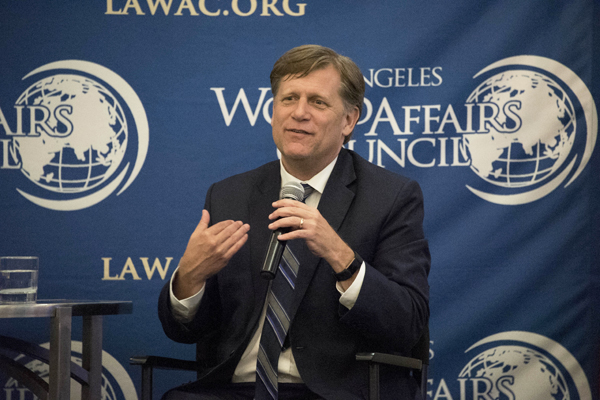 Michael McFaul discussed the power of Putin at a LAWAC dinner event.
Michael McFaul discussed the power of Putin at a LAWAC dinner event.The first time Michael McFaul met Vladimir Putin was in 1991 and he was an assistant to the mayor of St Petersburg. “He made absolutely no impression on me at all,” said McFaul. “I would never have predicted back then that he would become President of Russia.” Years later, when McFaul arrived in Moscow in 2012 as the US ambassador, Putin had become a very different man. At their very first meeting, Putin turned to McFaul and shouted at him about ‘certain people’ who were damaging US-Russian relations -- meaning McFaul. “He had that cold, penetrating look -- very intimidating – I had sweat running down my back,” McFaul told a dinner of the Los Angeles World Affairs Council on May 24th. “He likes to get inside your head – after all, he is a former KGB agent.”
McFaul believes that individual actors play a substantial role in history in parallel with greater socioeconomic forces. Putin looms large in his analysis of where Russia is, and where it might have been had someone else been appointed president by the ailing Boris Yeltsin in 1999. When asked why Russia has such a negative and destructive policy to the US, McFaul answered, “One word: Putin.”
While McFaul concedes that NATO expansion wasn't appreciated by the Russians, he suggested that it was the US action, or inaction, in the immediate post-Cold War period that did most of the damage. “The biggest mistake we made was right after the Cold War ended. We thought we had won and didn’t help them through that period – there was no Marshall Plan, not enough money.” And the recession the Russians endured at the beginning of the 1990’s was way worse than anything the West experienced. “By the time Clinton got there in January 1993, the reformers had already been thrown out of government.” This led to the rising power of the oligarchs, who needed a strong leader to protect them.
However, McFaul said Russians remained favorably disposed to America through the Clinton and Bush years. “In 2010, 60% of Russians said they viewed the US favorably. Today, 85% see the US negatively.” What happened? McFaul worked for President Obama and Secretary of State Hillary Clinton during the period of the attempted reset of relations with Russia. For a while it appeared to be going well, particularly during the interim presidency of Dmitry Medvedev, who was (nominally) in charge from 2008-12. “But in 2011 two things happened: Putin announced he would run for president again [in 2012] and people began protesting in the Arab Spring uprisings.” The Arab Spring uprisings led to toppling of regimes with autocratic rulers in the Middle East and by the end of the year there were anti-Putin demonstrations in Moscow. “That is when Putin turned against us – he blamed the US for fomenting those demonstrations.”
Today, Putin blames the US as a tool of his domestic politics, and with his complete control over the news media, many Russians support him. “The future is very scary,” said McFaul. Not only are the Russians modernizing their nuclear weapons – to include a nuclear-tipped submarine – but they have also become extremely skilled at propagating fake news. And the US has been very slow to harden its cyber protections. “How many people in the audience use double authentication to protect their emails?” McFaul asked. Few people put their hands up, many didn’t even know what it was. “You see, that is why the Russians are dangerous.”
Asked about how the US can actually get to Putin to affect his behavior, McFaul said that the leaking of the Panama Papers got to him, with their revelations of secret offshore accounts involving Putin’s friends. “Obama used to ask ‘How much is he worth?’ but that is the wrong question,” said McFaul. “He is more like a czar. Does he own a yacht? No. But he can get on any yacht that he wants. All that is in Russia is at his disposal.” And that is the root of the problem.
